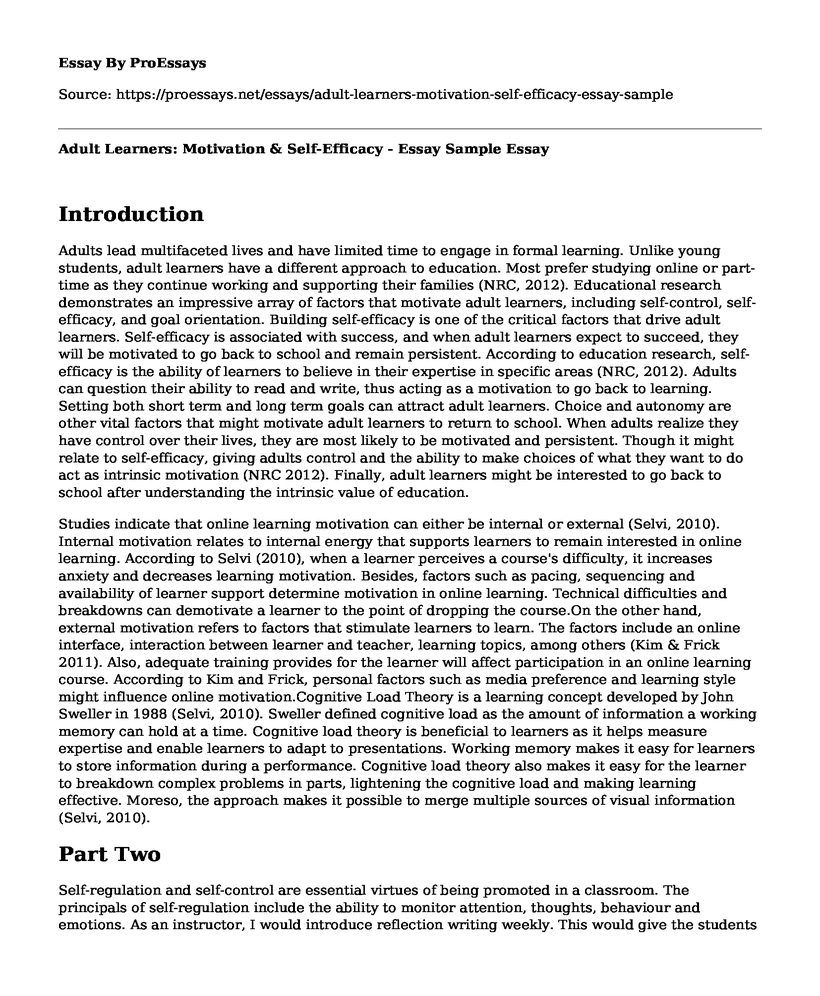Introduction
Adults lead multifaceted lives and have limited time to engage in formal learning. Unlike young students, adult learners have a different approach to education. Most prefer studying online or part-time as they continue working and supporting their families (NRC, 2012). Educational research demonstrates an impressive array of factors that motivate adult learners, including self-control, self-efficacy, and goal orientation. Building self-efficacy is one of the critical factors that drive adult learners. Self-efficacy is associated with success, and when adult learners expect to succeed, they will be motivated to go back to school and remain persistent. According to education research, self-efficacy is the ability of learners to believe in their expertise in specific areas (NRC, 2012). Adults can question their ability to read and write, thus acting as a motivation to go back to learning. Setting both short term and long term goals can attract adult learners. Choice and autonomy are other vital factors that might motivate adult learners to return to school. When adults realize they have control over their lives, they are most likely to be motivated and persistent. Though it might relate to self-efficacy, giving adults control and the ability to make choices of what they want to do act as intrinsic motivation (NRC 2012). Finally, adult learners might be interested to go back to school after understanding the intrinsic value of education.
Studies indicate that online learning motivation can either be internal or external (Selvi, 2010). Internal motivation relates to internal energy that supports learners to remain interested in online learning. According to Selvi (2010), when a learner perceives a course's difficulty, it increases anxiety and decreases learning motivation. Besides, factors such as pacing, sequencing and availability of learner support determine motivation in online learning. Technical difficulties and breakdowns can demotivate a learner to the point of dropping the course.On the other hand, external motivation refers to factors that stimulate learners to learn. The factors include an online interface, interaction between learner and teacher, learning topics, among others (Kim & Frick 2011). Also, adequate training provides for the learner will affect participation in an online learning course. According to Kim and Frick, personal factors such as media preference and learning style might influence online motivation.Cognitive Load Theory is a learning concept developed by John Sweller in 1988 (Selvi, 2010). Sweller defined cognitive load as the amount of information a working memory can hold at a time. Cognitive load theory is beneficial to learners as it helps measure expertise and enable learners to adapt to presentations. Working memory makes it easy for learners to store information during a performance. Cognitive load theory also makes it easy for the learner to breakdown complex problems in parts, lightening the cognitive load and making learning effective. Moreso, the approach makes it possible to merge multiple sources of visual information (Selvi, 2010).
Part Two
Self-regulation and self-control are essential virtues of being promoted in a classroom. The principals of self-regulation include the ability to monitor attention, thoughts, behaviour and emotions. As an instructor, I would introduce reflection writing weekly. This would give the students ability to reflect on the course and teaching methods. To encourage students to self-regulate during evaluations and assessments, I would help them to create standards and criteria for assessment. I would never judge any students, and this would build a positive and trusting environment. When students learn that they cannot be judged and the evaluation will be kept private, they will always be self-regulating in the classroom.
Self-efficacy and self-regulating are concepts that can be applied in high school settings. I believe that introducing the idea in a high school setting will encourage students to plan and stick to their goals. Moreover, it might increase critical thinking among the students. However, I think introducing the theories in a high school setting might be a risky move for the instructors. For instance, an instructor introduced self-regulating skills in High School in Tumwater, WA and learnt that most students were lagging in class. I believe this was because some students were unable to self-monitor their behaviours and emotions.
While designing a course for students who might become supervisors, assembly workers, or mid-level managers, I would consider designing an online course. This would help develop self-regulating qualities among the students. Besides, they will be able to learn the issue of time management on their own. Besides, I would include self-assessment every week. As supervisors and managers, they will be subjected to evaluate the work of other staff and make recommendations. Self-assessment writing will enhance their skills.
Reference
Kim, K. J., & Frick, T. W. (2011). Changes in student motivation during online learning. Journal of Educational Computing Research, 44(1), 1-23.
National Research Council. (2012). Improving adult literacy instruction: Supporting learning and motivation. National Academies Press.
Selvi, K. (2010). Motivating factors in online courses. The Procedia – Social and Behavioral Sciences, 2, 819-824
Cite this page
Adult Learners: Motivation & Self-Efficacy - Essay Sample. (2023, Aug 28). Retrieved from https://proessays.net/essays/adult-learners-motivation-self-efficacy-essay-sample
If you are the original author of this essay and no longer wish to have it published on the ProEssays website, please click below to request its removal:
- Research Paper on Attention-Deficit Hyperactivity Disorder in School-Aged Kids
- Early Childhood Experiences Shape Health and Well-Being Throughout Life Essay
- How Parents Can Promote Good Reading Habits in Their Children Essay
- Endangered Language Analysis Essay Example
- Essay Sample on My Credo for Communication in Interpersonal Conflict
- Essay on Video Gaming: A Powerful Tool for Child Development?
- Essay on Improving Teacher Induction Programs Through Supervision & Staff Development







